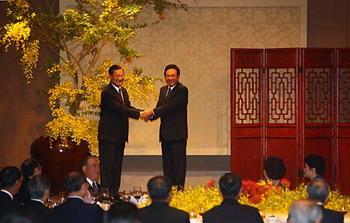China
KMT honorary chairman: Cross-Straits agreements earn applause
Source: Xinhua | 11-05-2008 08:34
Special Report: ARATS Chief visits TaiwanTAIPEI, Nov. 4 (Xinhua) -- Taiwan's ruling Kuomintang (KMT) honorary chairman Lien Chan said Tuesday that the new agreements between the Chinese mainland and Taiwan "earn a real applause" and could benefit both sides.
 |
| Kuomintang honorary chairman Lien Chan (L) shakes hands with mainland's Association for Relations Across the Taiwan Straits (ARATS) President Chen Yunlin in Taipei, southeast China's Taiwan Province Nov. 4, 2008. Lien held a banquet for Chen and his delegation here on Tuesday.(Xinhua Photo) |
Lien held a banquet in Taipei to welcome the mainland's Association for Relations Across the Taiwan Straits (ARATS) president Chen Yunlin and his delegation.
"From a historical perspective, Chen's visit realizes a decade-old wish of President Wang Daohan and Chairman Koo Chen-fu, announces the establishment of an institutionalized consultation channel, and strengthens the base of cross-Straits mutual development and mutual benefits, " Lien said in his address.
In April 1993, late ARATS President Wang and Koo, late chairman of Taiwan-based Straits Exchange Foundation (SEF), held a historic "Wang-Koo meeting" in Singapore. It was the first public meeting between leaders of the two organizations.
Lien said Chen's current visit also symbolized a great step toward establishing mutual trust and achieving a win-win situation.
Chen and SEF chairman Chiang Pin-kung signed agreements on direct shipping and flights, postal services and food safety during their first summit in Taipei on Tuesday.
The agreements were expected to end a situation that has prevailed since 1949, which required air and sea movements between the Chinese mainland and Taiwan to go through a third place.



